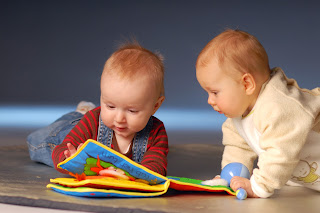Extroverted vs. Introverted
What`s the first image that pops into your head when you think of a spirited child? I think the popular impression is that of a fearless child that is like a human ping-pong ball with an unending motor mouth banter that defies the speed of sound. Did I come close? The truth is, being spirited can come in a variety of different packages, depending on how the person is internally wired.
Not every spirited child is physically energetic or outgoing. `Spirited`simply means a characteristic intensity. Whether that be the constant physical need to move, the passionately chatty or a very determined and persistent demeanor. My son falls in the last two categories. He`s not overly active in the physical sense, but is very sure of what he wants and how he feels about everything and has no qualms about fighting to the very end to defend his point! Our challenges lie in battles of will and emotional intensity.
The same goes for the socially cautious spirited child. Contrary to what many may think, they are not all animated, outgoing and chatty. According to Mary Sheida Kurcinka, author of`"Raising Your Spirited Child", we all draw our energy in different ways depending on whether we are primarily extroverted or introverted. The classic extrovert is the person who is the life of the party, heading the fundraisers, and are the ones who love to talk to anyone and everyone. They draw their energy from the people around them. They need that in order to function happily. The introvert, who makes up about 1/3 of the populas, is the person who is the quiet, thoughtful one that usually prefers meaningful company of 1 or 2 and gravitates toward jobs or activities that are solitary and specialized. They need quiet times of reflection and peace to refuel and energize.
Understanding which tendancy your spirited child falls into, as well as yourself, goes a long way into understanding and disciplining your child. My son, for example, loves people but only in small groups and for a limited time. After a couple of hours, he gets overly assertive and highly emotional and it can quickly spiral into a meltdown that he has a very hard time coming down from. He is primarily introverted and needs time throughout his day where it`s quiet and his mind can process what`s been going on. His spirited nature comes through emotionally.
How you can detertime which one you and your child are with the following questions:
-After being in a mall or at a family gathering all day, do you or your child feel energized or do you just want to have some peace and quiet? Does your child start to act out or get aggressive after an extended play session?
-What is your social circle like? Do you or your child prefer a few close friends or is more the merrier?
-When a question is presented, do you answer immediately? Or do you need some time to think before coming up with your answer. How about your child? Are decisions difficult?
Once you`ve determined which tendancies you have and what your child prefers, you can start to try and understand why they may do the things they do and how you can handle explosive meltdowns and even prevent them. If you`re an introverted mama but your child is extroverted, you may need to put some focus and effort into bringing them into more social environments like playgroups, preschool, or daycare once or twice a week if you are a stay-at-home mom. They will be much more content and agreeable if that fundamental energy need is met.
Or, if you`re an extroverted mom and your child is introverted, you may need to pay extra attention to being sensitive to when your child needs to refuel and has had enough of a highly social stimulus. Even just taking a 5 or 10 minute quiet break like a little walk outside, or working on a puzzle or reading a book alone may be all he needs to recharge and prevent a grumpy blowout.
It`s simple really. Once you understand what the fundamental nature of your child is, as well as yourself, it just comes down to energy. If ours and our childrens`energy stores are properly topped up, we are happier, and therefore more agreeable. That means less melt downs and spiralling emotional outbursts from our intensely driven dynamos. This is very important in developing not only a peaceful household, but in helping to instill confidence and a strong sense of self-esteem within your child when they know how to accept their unique nature and have the tools to handle their own intensity.



























